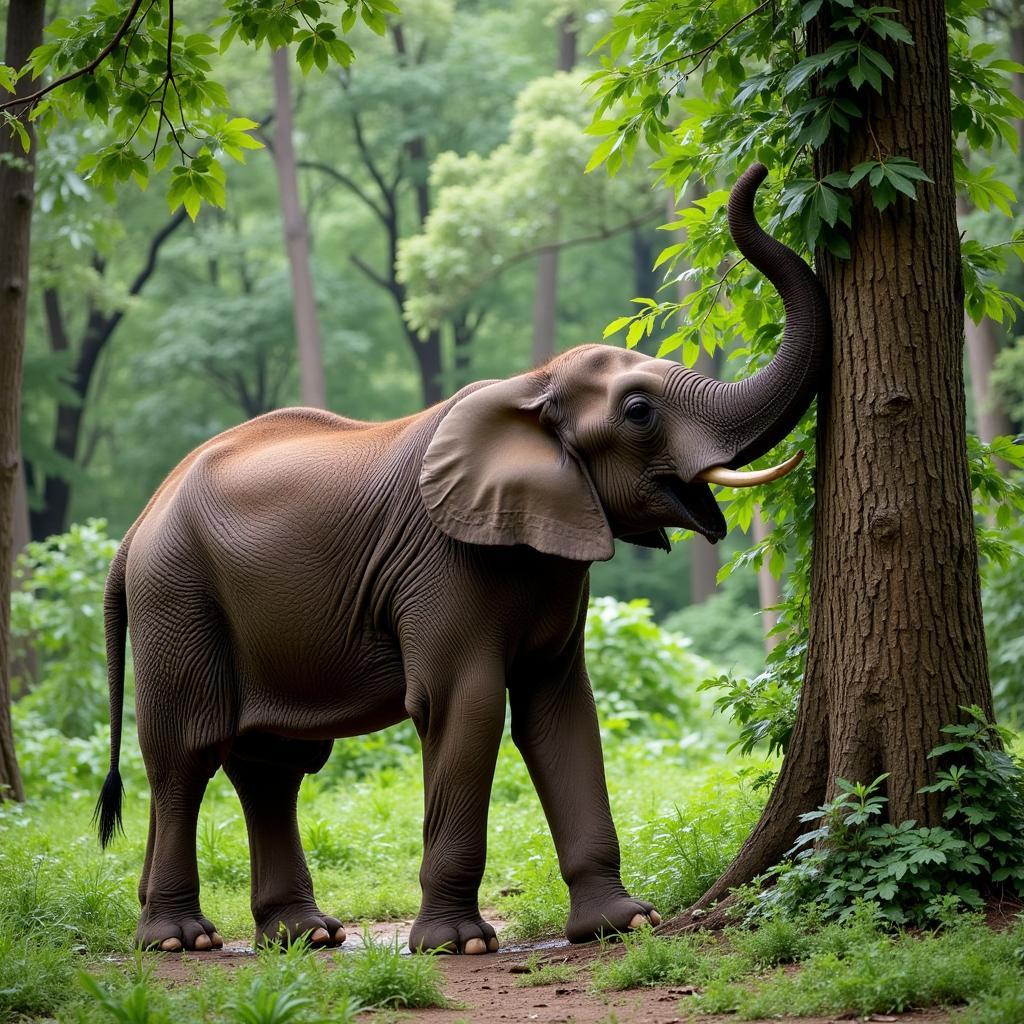Unveiling the African Forest Elephant Lifestyle
The African forest elephant, scientifically known as Loxodonta cyclotis, leads a captivating life shrouded in the dense rainforests of Central Africa. These majestic creatures, smaller than their savanna counterparts, play a vital role in maintaining the delicate balance of their ecosystem.
Navigating the Forest Depths: A Day in the Life
A typical day for an African forest elephant revolves around foraging for food and navigating their intricate rainforest home. They are primarily herbivores, consuming vast quantities of leaves, fruits, bark, and soil for minerals.
 African forest elephant foraging for food
African forest elephant foraging for food
These gentle giants are highly social animals, living in tightly-knit family groups led by a matriarch, often the oldest and most experienced female. The matriarch guides the herd to familiar feeding grounds and water sources, passing down crucial knowledge about their environment to younger generations.
The Forest Architects: Ecological Significance
African forest elephants play a crucial role in shaping their ecosystem, earning them the title “forest gardeners.” Their foraging habits create clearings in the dense vegetation, promoting sunlight penetration and encouraging new growth.
Furthermore, their dung acts as a natural fertilizer and seed disperser, transporting seeds across vast distances and contributing to the biodiversity of the rainforest. This interconnectedness highlights the importance of preserving these elephants and their habitat.
 African forest elephant family group
African forest elephant family group
Threats to a Gentle Giant: Conservation Concerns
Unfortunately, African forest elephants face numerous threats, primarily from habitat loss due to deforestation and human encroachment. The illegal ivory trade also poses a significant danger, with their tusks highly prized in some markets.
Conservation efforts are crucial to protecting these magnificent creatures. Organizations worldwide are working tirelessly to combat poaching, protect elephant habitats, and raise awareness about the plight of these gentle giants.
FAQs: Delving Deeper into the Forest Elephant World
1. How do African forest elephants differ from African bush elephants?
While both species are African elephants, forest elephants are smaller, with straighter tusks and rounded ears. Their social structures and habitats also differ, with forest elephants residing in dense rainforests and bush elephants inhabiting savannas.
2. What is the current population status of African forest elephants?
The IUCN Red List categorizes African forest elephants as Critically Endangered, with their populations declining rapidly due to poaching and habitat loss.
3. How can I contribute to African forest elephant conservation?
You can support organizations working to protect elephants, spread awareness about their plight, and make conscious choices to avoid products contributing to deforestation or the ivory trade.
Exploring Further: The African Wilderness Awaits
This glimpse into the African Forest Elephant Lifestyle is just the beginning. Delve deeper into the wonders of the African continent:
- Discover the vibrant cultures of African countries.
- Explore the excitement of the African Cup of Nations 2017.
- Immerse yourself in the diverse world of African genres.
For personalized support and inquiries, contact us at +255768904061, kaka.mag@gmail.com, or visit our office in Mbarali DC Mawindi, Kangaga, Tanzania. Our dedicated team is available 24/7 to assist you.


